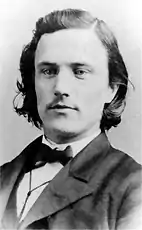Wikisource has original text related to this article:
| |||||
| Decades: |
| ||||
|---|---|---|---|---|---|
| See also: | |||||
| Part of a series on the |
| History of Canada |
|---|
 |
| Timeline (list) |
| Historically significant |
| Topics |
| By provinces and territories |
| Cities |
| Research |
Events from the year 1898 in Canada.
Incumbents
Crown
Federal government
Provincial governments
Lieutenant governors
- Lieutenant Governor of British Columbia – Thomas Robert McInnes
- Lieutenant Governor of Manitoba – James Colebrooke Patterson
- Lieutenant Governor of New Brunswick – Jabez Bunting Snowball
- Lieutenant Governor of Nova Scotia – Malachy Bowes Daly
- Lieutenant Governor of Ontario – Oliver Mowat
- Lieutenant Governor of Prince Edward Island – George William Howlan
- Lieutenant Governor of Quebec – Joseph-Adolphe Chapleau (until January 20) then Louis-Amable Jetté
Premiers
- Premier of British Columbia – John Herbert Turner (until August 15) then Charles Augustus Semlin
- Premier of Manitoba – Thomas Greenway
- Premier of New Brunswick – Henry Emmerson
- Premier of Nova Scotia – George Henry Murray
- Premier of Ontario – Arthur Sturgis Hardy
- Premier of Prince Edward Island – Alexander Warburton (until August 1) then Donald Farquharson
- Premier of Quebec – Félix-Gabriel Marchand
Territorial governments
Commissioners
- Commissioner of Yukon – James Morrow Walsh (until July 5) then William Ogilvie
Lieutenant governors
- Lieutenant Governor of Keewatin – James Colebrooke Patterson
- Lieutenant Governor of the North-West Territories – Charles Herbert Mackintosh (until May 30) then Malcolm Colin Cameron (May 30 to September 26) then Amédée E. Forget (from October 4)
Premiers
Events
- March 1 – 1898 Ontario election: A. S. Hardy's Liberals win a majority
- June 13 – Yukon becomes a distinct territory from the North-West Territories
- July 29 – White Pass and Yukon Route opens (Skagway–Whitehorse)
- August – Donald Farquharson becomes Premier of Prince Edward Island, replacing A. B. Warburton
- August 8 – John Herbert Turner is dismissed as premier of British Columbia
- August 15 – Charles Semlin becomes premier of British Columbia
- September 11 – New Westminster, British Columbia destroyed by fire.
- September 29 – The Canadian referendum on the prohibition of alcohol.
- November 4 – The fourth election of the North-West Legislative Assembly
Full date unknown
- The Parliament of Canada passes the Quebec Boundary Extension Act, expanding the provincial boundaries northward to include the lands of the aboriginal Cree.
- Kit Coleman covers the Spanish–American War as Canada's first female war correspondent
Arts and literature
Births
- May 20 – Paul Gouin, politician (d.1976)
- May 27 – William Arthur Irwin, journalist
- July 7 – Hugh Llewellyn Keenleyside, diplomat, civil servant and 5th Commissioner of the Northwest Territories (d.1992)
- July 17 – Osmond Borradaile, cameraman, cinematographer and veteran of First and Second World War (d.1999)
- August 23 – Brooke Claxton, politician and Minister (d.1960)
- August 27 – Gaspard Fauteux, politician, Speaker of the House of Commons of Canada and Lieutenant-Governor of Quebec (d.1963)
- August 30 – Gleason Belzile, politician (d.1950)
- November 9 – Emmett Matthew Hall, jurist, civil libertarian and Supreme Court justice (d.1995)
- December 1 – Stuart Garson, politician, Minister and 12th Premier of Manitoba (d.1977)
- December 15 – George Lawrence Price, last Commonwealth casualty of World War I (d.1918)
Full date unknown
- Maurice Spector, Chairman of the Communist Party of Canada (d.1968)
Deaths

Theodore Davie
- January 1 – John Arthur Fraser, artist (b.1838)
- February 15 – Wilfrid Prévost, lawyer and politician (b.1832)
- March 7 – Theodore Davie, lawyer, politician and 9th Premier of British Columbia (b.1852)
- May 1 – Nazaire-Nicolas Olivier, lawyer and politician (b. c1860)
- May 13 – François Bourassa, farmer and politician (b.1813)

Joseph-Adolphe Chapleau
- April 12 – Elzéar-Alexandre Taschereau, Archbishop of Quebec (b.1820)
- June 13 – Joseph-Adolphe Chapleau, lawyer, politician and 5th Premier of Quebec (b.1840)
- July 14 – Louis-François Richer Laflèche, diocese of Trois-Rivières (b.1818)
- August 24 – Casimir Gzowski, engineer (b.1813)
Historical documents
Federal plebiscite on prohibition finds apathetic electorate (compared to general election turnout) delivers small majority in favour[2]
Touring U.S. farmers find paradise of meadows, prairies and woodlands in Saskatchewan[3]
Questionable building standards lead to fatal collapse of city hall floor in London, Ontario [4]
See also
References
- ↑ "Queen Victoria | The Canadian Encyclopedia". www.thecanadianencyclopedia.ca. Retrieved 5 December 2022.
- ↑ Samuel E. St. O. Chapleau, "Report on the Prohibition Plebiscite Held on the 29th Day of September 1898" (January 2, 1899), Sessional Papers, Volume 14, Fourth Session of the Eighth Parliament, pgs. vi, viii and x (pages interspersed with text in French). Accessed 4 October 2020
- ↑ Department of the Interior, Reports of United States Delegates on Western Canada (1898), pgs. 9-12 Accessed 21 December 2019
- ↑ "The London Building Disaster" The Canadian Architect and Builder, Vol. XI, Issue 1 (January 1898), pg. 2. Accessed 21 December 2019
This article is issued from Wikipedia. The text is licensed under Creative Commons - Attribution - Sharealike. Additional terms may apply for the media files.